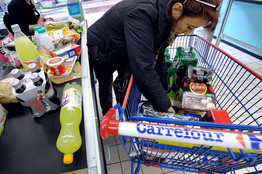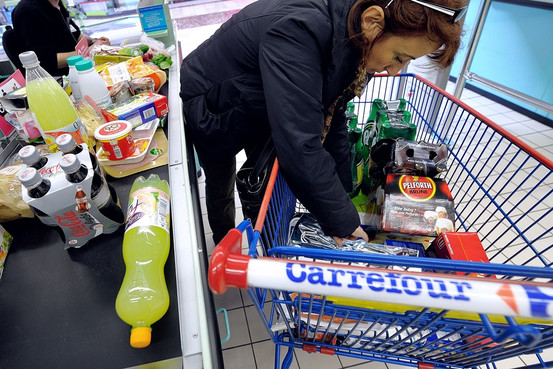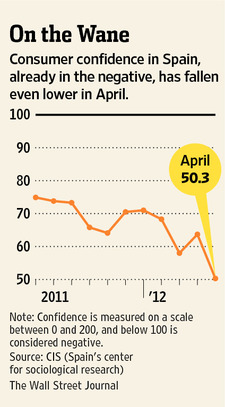Value Driven Innovation
05/30/12 13:29 Filed in: Innovation
Global recession is driving marketers to rethink the value proposition of their brands. Consumer pursuit of value led to popularity of private label products and "Dollar Store" outlets. As recently reported in WSJ (5/29/11), it is now spreading to Europe. Nestle is stepping up offerings of "popularity positioned products". Unilever is also stepping up output of items with retail prices of €1 or £1 in Europe.
Here is the full article -
Food Makers Rethink Europe
Nestlé, Unilever Roll Out Less-Expensive Items for Cash-Strapped Consumers By JOHN REVILL
Strapped consumers in economically racked Southern Europe are changing their shopping habits—prompting global food companies to use some of the sales tactics they developed for emerging markets.
Many companies are repackaging successful standard products into less-costly, smaller versions for low-income shoppers, much as the companies have done in Asia and Latin America.
Across Southeast Asia, for the local equivalent of about 10 cents each, Nestlé SA sells products such as single-sachet versions of Nestea lemon tea and Nescafé 3-in-1 coffee. Now, the Switzerland-based company is introducing similar products and sizes in parts of Europe.


Philippe Huguen/Agence-France Presse/Getty Images
France's Carrefour has sped up development of store-brand products. Above, a Hazebrouck, France, store.
One of Nestlé's key products has been instant noodles. The noodles, developed for Asia and produced in Ukraine, are now sold on the Continent.
The €1 Price Point
Unilever has been producing lower-price containers of shampoo and household staples for European consumers, such as its Knorr Economica bouillon cube, which costs 60% less than standard cubes.
Unilever also is stepping up output of items with retail prices of €1 or £1, or roughly $1.25 or $1.50, respectively.
"With around one in five people now officially living beneath the poverty line in countries like Spain and Greece, it's critical that we find new solutions to ensure that people across the region continue to enjoy our brands, while keeping in control of their household budget," says Matt Close, Unilever's head of European marketing.
He says the strategy is vital for Unilever to reignite growth in Europe. The Anglo-Dutch company's sales increased just 0.7% in the region last year.
"This year will be a big challenge with some economies in recession," says Laurent Freixe, the head of Europe for Nestlé. "There are unemployed young people, students, single parent families, and pensioners. These people are generally living on a lower income, and their budgets are being stretched. We can provide them with relevant options," he says, referring to smaller and sometimes reformulated less-expensive items.
Nestlé this year plans to step up offerings of what it calls "popularly positioned products" to defend against the rising importance of private-label brands, which more consumers gravitate toward when purse strings are tight. PPPs typically are more affordable than mainstream products because they come in smaller packages or use slightly different recipes. A typical example in Europe is a pack of 25 individual Nescafé instant-coffee sticks, which sells for less than €2 in France.
Private Label Popularity
Nestlé says sales of PPPs rose last year at more than double the 4% rate of its European business as a whole. "We expect it to continue at the same rate this year," Mr. Freixe says.

In the tough economic climate, private-label food products and supermarkets' own brands are rising in popularity, as squeezed customers increase their search for bargains, damping prospects for makers of branded goods.
The Private Label Manufacturers Association expects to gain at least an extra percentage point in market share in Europe this year, with Spain, Britain and Eastern Europe leading the way. Private-label products currently account for just under half the volume sold in these countries, according to the trade group.
Supermarkets also have stepped up their efforts to attract budget-conscious customers.
Losing Loyalty
France's Carrefour SA, which has branches throughout Europe, has accelerated the development of its Carrefour-branded products, having introduced more than 1,000 new or repackaged products since last September.
Tesco PLC recently introduced a new line, called Everyday Value, which builds on the U.K.-based retailer's successful Tesco Value line, which generated sales of £1 billion last year. Among its offerings, tins of baked beans for 29 pence.
For shoppers, meanwhile, brand loyalty is out the window.
"I'm really feeling the crisis and need to cut down on supermarket bills," says Adelina Encarnacao Sousa Ponte Lima, a 50-year-old cleaner from Lisbon. "Taxes are higher, salaries are lower. There isn't spare money. Right now, I don't care what brand it is, I just go for what is the cheapest."
.
Here is the full article -
Food Makers Rethink Europe
Nestlé, Unilever Roll Out Less-Expensive Items for Cash-Strapped Consumers By JOHN REVILL
Strapped consumers in economically racked Southern Europe are changing their shopping habits—prompting global food companies to use some of the sales tactics they developed for emerging markets.
Many companies are repackaging successful standard products into less-costly, smaller versions for low-income shoppers, much as the companies have done in Asia and Latin America.
Across Southeast Asia, for the local equivalent of about 10 cents each, Nestlé SA sells products such as single-sachet versions of Nestea lemon tea and Nescafé 3-in-1 coffee. Now, the Switzerland-based company is introducing similar products and sizes in parts of Europe.


Philippe Huguen/Agence-France Presse/Getty Images
France's Carrefour has sped up development of store-brand products. Above, a Hazebrouck, France, store.
One of Nestlé's key products has been instant noodles. The noodles, developed for Asia and produced in Ukraine, are now sold on the Continent.
The €1 Price Point
Unilever has been producing lower-price containers of shampoo and household staples for European consumers, such as its Knorr Economica bouillon cube, which costs 60% less than standard cubes.
Unilever also is stepping up output of items with retail prices of €1 or £1, or roughly $1.25 or $1.50, respectively.
"With around one in five people now officially living beneath the poverty line in countries like Spain and Greece, it's critical that we find new solutions to ensure that people across the region continue to enjoy our brands, while keeping in control of their household budget," says Matt Close, Unilever's head of European marketing.
He says the strategy is vital for Unilever to reignite growth in Europe. The Anglo-Dutch company's sales increased just 0.7% in the region last year.
"This year will be a big challenge with some economies in recession," says Laurent Freixe, the head of Europe for Nestlé. "There are unemployed young people, students, single parent families, and pensioners. These people are generally living on a lower income, and their budgets are being stretched. We can provide them with relevant options," he says, referring to smaller and sometimes reformulated less-expensive items.
Nestlé this year plans to step up offerings of what it calls "popularly positioned products" to defend against the rising importance of private-label brands, which more consumers gravitate toward when purse strings are tight. PPPs typically are more affordable than mainstream products because they come in smaller packages or use slightly different recipes. A typical example in Europe is a pack of 25 individual Nescafé instant-coffee sticks, which sells for less than €2 in France.
Private Label Popularity
Nestlé says sales of PPPs rose last year at more than double the 4% rate of its European business as a whole. "We expect it to continue at the same rate this year," Mr. Freixe says.

In the tough economic climate, private-label food products and supermarkets' own brands are rising in popularity, as squeezed customers increase their search for bargains, damping prospects for makers of branded goods.
The Private Label Manufacturers Association expects to gain at least an extra percentage point in market share in Europe this year, with Spain, Britain and Eastern Europe leading the way. Private-label products currently account for just under half the volume sold in these countries, according to the trade group.
Supermarkets also have stepped up their efforts to attract budget-conscious customers.
Losing Loyalty
France's Carrefour SA, which has branches throughout Europe, has accelerated the development of its Carrefour-branded products, having introduced more than 1,000 new or repackaged products since last September.
Tesco PLC recently introduced a new line, called Everyday Value, which builds on the U.K.-based retailer's successful Tesco Value line, which generated sales of £1 billion last year. Among its offerings, tins of baked beans for 29 pence.
For shoppers, meanwhile, brand loyalty is out the window.
"I'm really feeling the crisis and need to cut down on supermarket bills," says Adelina Encarnacao Sousa Ponte Lima, a 50-year-old cleaner from Lisbon. "Taxes are higher, salaries are lower. There isn't spare money. Right now, I don't care what brand it is, I just go for what is the cheapest."
.
